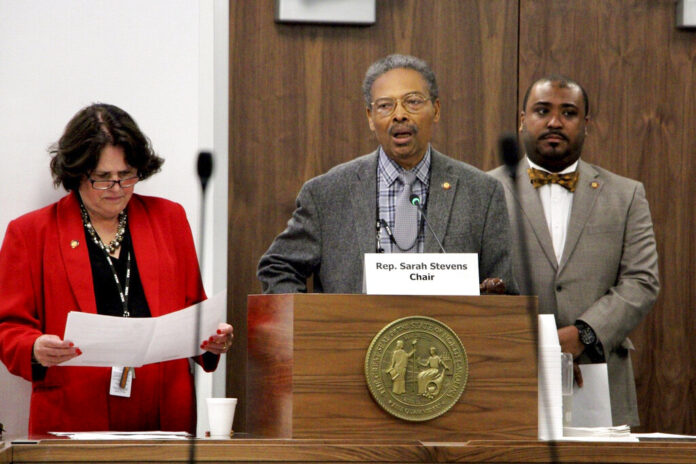
RALEIGH, N.C. (AP) — North Carolina lawmakers and voters have rejected past efforts to strip an unenforceable literacy test requirement from the state constitution that was used for decades to disenfranchise Black voters. But some say a renewed proposal that passed its first committee on Wednesday marks the best recent attempt to do so.
A House judiciary committee voted unanimously to advance a bipartisan measure that would allow voters to decide next year whether to strike the controversial section from the state constitution.
Widely considered a racist relic of the Jim Crow era, the literacy test required that everyone registering to vote “be able to read and write any section of the Constitution in the English language.” It became unlawful under the federal Voting Rights Act of 1965.
Rep. Terry Brown Jr., a Mecklenburg County Democrat, called for colleagues on “both sides of the aisle” to talk with their constituents about getting the section off the books. “I do believe the stars might be aligning this year for us to finally get this done,” said Brown, a primary sponsor.
The House unanimously passed a similar referendum in 2013, but it did not advance in the Senate. Renewed attempts in 2019 and 2021 also sputtered.
Three-fifths of the state House and Senate members would have to agree to offer the ballot question to voters in 2024. It would not be subject to the governor’s approval.
Added to the state constitution in 1900, the literacy test requirement was used for decades to prevent Black residents from casting ballots. Rep. Kelly Alexander, a Mecklenburg County Democrat and another primary sponsor, said prospective voters were required to read a passage to the satisfaction of the registrar.
“That is about as subjective a test as you could have,” he said.
Although the requirement had already become unlawful under the federal Voting Rights Act, North Carolina voters in 1970 defeated a constitutional amendment to remove the provision.
Advocates warned at the committee meeting Wednesday of a possible repeat outcome if politicians use the proposal as “a political bludgeon” to attack their opponents in an upcoming election and inadvertently drive down public support. Some said the requirement’s lingering presence reflects poorly on the state and sends an alienating message to its Black residents.
Even as lawmakers signal that legislative support has grown — including in the Senate, which hasn’t taken up previous proposals — Andy Jackson of the conservative John Locke Foundation said the public vote could be “an uncomfortably close margin” if the matter becomes more politicized.
Senate leader Phil Berger said on Tuesday that he thinks a majority of North Carolina voters recognize or will recognize why the section should be removed. He had voiced his support for a repeal in January, signaling that it could gain greater momentum than in past years.
“I think this may be the year, but I’ve been wrong before,” Berger said. “I think for folks who first hear about it to know that it’s in the constitution, they would be surprised. And if you look at the history of how it got into the constitution, I think most folks are more convinced that it ought to be out of the constitution.”

